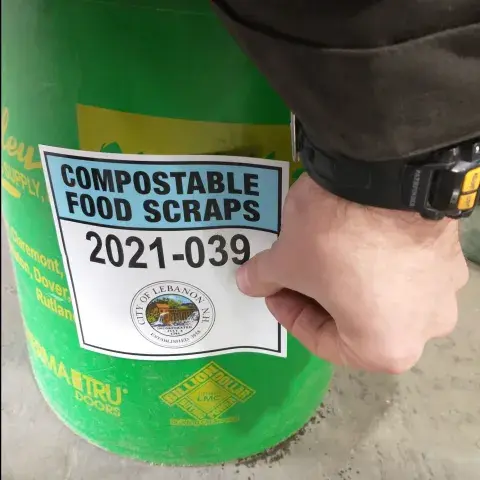
Marc Morgan, Solid Waste Manager at Lebanon, NH Recycling Center, led a conversation about municipal composting as the guest speaker for NRRA’s March 10 Member Operations and Marketing (MOM) meeting. Thirty-six members gathered online to hear how Lebanon has been accepting food scraps from Dartmouth Hitchcock Medical Center and Dartmouth College for the last ten years.
When planning to compost food scraps, NH communities, please remember to contact Mike Nork at NHDES to discuss your plans. Composting meat and dairy products with food scraps will likely require requesting a waiver of the current NHDES regulations or a permit modification, depending on your situation. It is recommended to tour a nearby municipality that is already composting to see it in action.
First, start small with a pilot study when composting. That way, if there are problems with contamination, you will know who to talk with to explain what is accepted. Lebanon just started accepting residential food scraps in January 2021 after ten years of experience with the above major customers. Second, attend one of the compost schools or do online research. It is different than backyard composting because you will be dealing with much more material at one time. Third, you need to have the equipment and budget - such as thermometers to track daily temperature of the compost pile, equipment to turn the piles or windrows of material, and staff time to dedicate to this program. Most importantly, you need to have carbon. Many recycling facilities think that the limiting factor for a successful municipal food scrap compost pile is space. Marc stressed that the limiting factor is access to carbon - whether it is leaves, ash, or chipped trees. Lebanon has found that the residents’ leaves are not enough and they purchase additional chipped material to add to their compost pile.
Before starting a municipal food scrap pile, you need to have an end product in mind. Some towns may choose to sell their compost back to their residents, other towns are hesitant to do so. Lebanon uses their compost as landfill cover, topsoil for erosion control, and at cemeteries, parks, and athletic fields instead of purchasing topsoil.
Lebanon has opened composting to residents to drop off food scraps in the last 10 weeks.136 people prepaid for a year to receive a permit to compost. They also use a webpage app called BetterBin to clarify what is acceptable in the compost and to calculate their contributions. Over 400 pounds per week have been collected and added to yard waste piles. They do also accept meat and dairy because they are able to prove that they keep temperatures in their compost piles above 130-140 degrees, work with the USDA and have submitted paperwork to NHDES. They use compostable and PFAS-free Biobags for odor and vector control. Each town is different, but because Lebanon has both a landfill and a compost pile, they see a 30% savings from composting over landfilling food scrap material.
Lebanon accepts material from nearby NH and VT towns, so they have the unique situation of educating residents in two states. Vermont has a yard waste ban and a food waste ban, and NH regulations may be rewritten later this year. There is still motion on ways to keep the weight out of our waste! Staff from Hopkinton have already taken a field trip to Lebanon to see the costs and staff commitment associated with composting since they are considering a program of their own.
Another interesting thing that came out of the conversation with Marc is that as Lebanon residents pay attention to their food scrap waste and transfer that from the garbage to the compost bin, the amount of food scraps have decreased. Residents may be changing their buying habits or using their fresh food more efficiently, so not to put as much food scraps into the bin.
